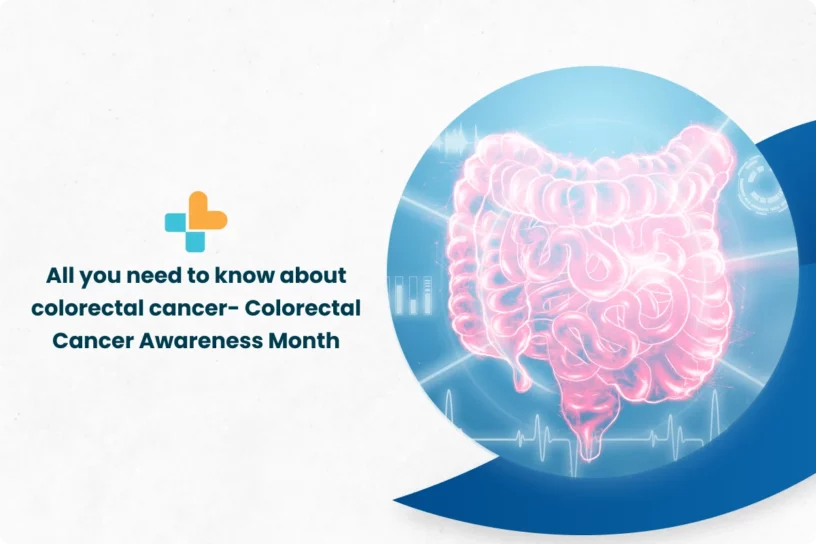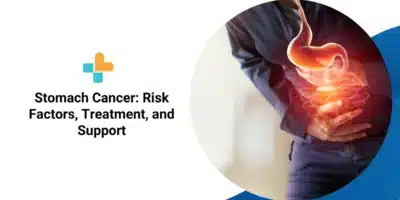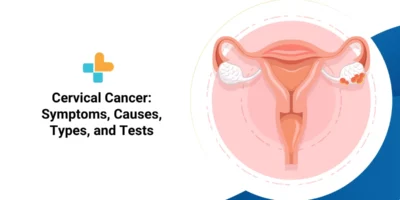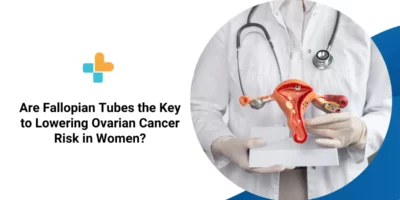Colorectal cancer is a type of cancer occurring in the colon or the rectum. Colorectal cancer begins when the cells in the colon or rectum start growing abnormally. In some instances, polyps (abnormal growths) may form within the colon or the rectum. These polyps may develop into cancer over time when left untreated. While the colon is the large intestine, the rectum is the connecting passage between the colon and the anus. When in its early stages, the symptoms of colorectal cancer may not be very prominent. Hence, regular screening is advised to people who are at a high risk of developing colorectal cancer, to initiate its early diagnosis and treatment.
This blog contains information about everything you need to know about colorectal cancer. So please keep reading.
What are the symptoms of colorectal cancer?
In its early stages, the symptoms of colorectal cancer may not be very prominent. However, as the cancer progresses, the following symptoms of colorectal cancer may appear,
- Sudden and unexplained loss of weight
- Changes in bowel habits
- Diarrhea
- Narrowed stools
- Bloody stools
- Constipation
- A feeling of incomplete bowel emptying
- Feeling fatigued
- Pain in the abdomen
- Bloating
- Anemia
It is crucial to seek medical attention immediately if the symptoms persist for several weeks or keep worsening.
What are the causes of developing colorectal cancer?
The exact causes of colorectal cancer are not known yet. However, a combination of environmental and genetic factors may play a part in the development of colorectal cancer. Additionally, there are various risk factors of colorectal cancer that may increase a person’s risk of developing it. These risk factors of colorectal cancer may include the following,
- Having obesity
- A lack of physical activity
- A sedentary lifestyle
- Being older than 50 years
- Eating a diet containing red meat and processed meat
- Chronic alcohol consumption
- Smoking
- Having conditions such as type 2 diabetes or inflammatory bowel diseases
- Having a family history of colorectal cancer
- A family history of adenomatous polyps
- A history of radiation therapy for abdominal cancer as a child
- A personal history of having had breast, uterine, or ovarian cancer
How to diagnose colorectal cancer?
Upon experiencing the symptoms that may indicate colorectal cancer, it is essential to consult a doctor and get the cancer diagnosis done. This diagnosis helps in the early detection of colorectal cancer, making it easy to treat. Upon suspecting the symptoms being experienced by the patient to be that of colorectal cancer, the doctor will prescribe the following diagnostic tests,
- A medical history examination
- A physical examination
- Blood tests, including tests such as complete blood count (CBC)
- Colonoscopy
- Biopsy
- Stool immunochemistry
- Stool DNA test
- Imaging scans such as ultrasound, Magnetic resonance imaging (MRI), Computed tomography (CT or CAT) scan, Positron emission tomography (PET) scan
- Barium enema X-ray
Treatment for colorectal cancer
After diagnosing colorectal cancer, the oncologist will formulate a treatment plan for the patient depending upon the stage of the cancer, the age of the patient, and overall patient health. The various options available for the treatment of colorectal cancer include the following,
- Surgery
- Chemotherapy
- Radiation therapy
- Targeted drug therapy
- Immunotherapy
- Ablation
- Palliative care
How to prevent colorectal cancer from developing?
There is no definitive way of preventing colorectal cancer. However, there are several preventive measures that can help in reducing the risk of developing it. These preventive measures include the following,
- Maintaining a healthy weight
- Eating a healthy diet containing fruits, vegetables, pulses, whole grains, etc
- Reducing the intake of red meat, processed meats
- Exercising regularly
- Quitting smoking
- Reducing alcohol consumption
Conclusion
Spreading colorectal cancer awareness is essential to promote its early detection since the symptoms of colorectal cancer are not prominent in the early stages of the cancer. Early detection can be promoted by raising awareness about getting screened for the cancer if you belong to the high-risk group or experience any symptoms that last longer than a few weeks or become severe. With early detection and advancements in the treatment of colorectal cancer, the cancer can be treated with a great prognosis.
At Ayu Health , we are committed to providing the best and most affordable care to all our patients, including those having colorectal cancer. Our expert team of highly skilled, qualified, and experienced oncologists works together to provide the best-individualized treatment plans and care to all our patients using the latest medical advances and techniques to achieve the best possible results.
Our Hospital Locations
Oncology Surgery Hospitals in Bangalore | Oncology Surgery Hospitals in Jaipur | Oncology Surgery Hospitals in NCR | Oncology Surgery Hospitals in Hyderabad
Our Doctors
Oncology Surgery Doctors in Bangalore | Oncology Surgery Doctors in Jaipur | Oncology Surgery Doctors in NCR | Oncology Surgery Doctors in Hyderabad
About the Author

Dr. S. Goel
Dr. S. Goel is a renowned Internal Medicine Specialist currently practicing at Ayu Health, Bangalore. He is a Specialist in Internal Medicine, Diabetes HTN, Paediatric Care, and Family Medicine.




